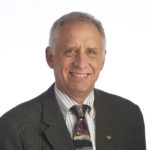It’s tough enough launching a business, even one as traditional in its structure as the EinsteinWise after-school tutoring program.
But trying to change the course of American math education — that’s a bit like trying to swim the length of the Columbia River, upstream.
Sudhakar Kudva and Sang Park say they created EinsteinWise to play a small part in helping raise U.S. math standards to the level of our nation’s economic competitors. It’s a grand ambition for a small after-school tutoring program, but the two men intend to continue their research as their program evolves. Meanwhile, Kudva has become active in discussions with local educators and legislators about how to improve math education statewide.
Improvements in math and science are desperately needed in order to better prepare students for today’s jobs, education and policy leaders agree. At a symposium this fall, the Washington State Academy of Sciences focused its attention on STEM — science, technology, engineering and math — education. Earll Murman, an emeritus professor of aeronautics and astronautics at Massachusetts Institute of Technology who is the academy’s president, says Washington’s math and science education isn’t keeping up with the needs of the state’s large high-tech sector.
“We end up being a large importer of people with math and science degrees,” said Murman, who lives in Port Townsend. The reasons for inadequate math and science education abound, he says: inadequate teacher preparation; a focus on testing outcomes rather than broad concepts; a perception by students that they don’t need math skills; and inadequate home support for math and science education.
Each of the symposium’s three speakers emphasized a key challenge for those working to improve math education, Murman said. “The biggest problem we have as a citizenry is that we don’t admit we have a problem,” he said.
Part of the challenge is in finding a way to assist all students, not just those who can afford private tutorial programs, says John Deeder, superintendent of Evergreen Public Schools.
“If you are able to access help for your kids, it’s wonderful,” Deeder said. “My concern is, How do we create an equitable situation in our community?”
Kudva and Sang hope to offer scholarships once their school gains traction. And some programs for people who can’t afford tutoring programs already exist. Washington State University Vancouver operates a MESA — Math, Engineering and Science Achievement — program that reaches some 250 high school students per year. Program director Armetta Burney says she taps student tutors and volunteer mentors to work with students who otherwise would not get extra attention. But the program, largely state funded, can meet only a fraction of the need.
Educators say the U.S. has much to learn from the success of Asian nations in math and science education, but they warn that it would be difficult to transfer Asian teaching techniques to America’s culture and education system.
“Not all things translate nicely from one system to another,” says David Slavit, math professor at Washington State University Vancouver. The key to success, he says, is to make math education relevant and exciting to U.S. students at an early age.
Paul Casillas, a Clark College math professor and former head of Clark’s math department, sees the problem of inadequate education in the number of students who lack basic math skills to enter the college’s programs in utility maintenance, heating and electrical systems, and aircraft systems, among others.
“The sad part is that with a couple of years of math, so many more doors are open to you that are closed to everybody else,” he said.



